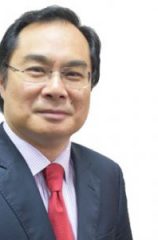In conversation with
Mr Christian Li Kwet Liit
Managing Director & Group CEO | CKLB Financial Services Group Ltd

FDI Spotlight: As the one of the founders of CKLB, how has the business changed since you started the company in 1998?
Christian Li: Almost 20 years ago, management companies in the global business sector were focusing mainly in assisting foreign investors both institutional and private, to establish corporate and investment funds structures wishing to invest in India and taking advantages of the favourable capital gains tax provisions of the double tax treaty agreement between Mauritius and India. These structures are required to be administered in Mauritius with the necessary compliance and substance in order for them to ensure local tax residency.
The treaty has now been renegotiated, and things have changed since, in the sense that Mauritius is not only a jurisdiction which is known for structuring Indian investments. In fact the reliance on the Indian treaty with Mauritius had already started to diminish throughout the years as various players entered the market in Mauritius which provided some diversification.
Now we find ourselves doing more and more private client work and providing family office support services to family offices and developing single family offices from existing client base and sometimes extending our services to what is referred to as ‘concierge services’. Our client base has remained European and Far East focus, although the destination of projects using Mauritius structures is almost 50% towards the African continent.
With over 100 management companies in Mauritius, how different is your business model and interaction with clients?
Christian Li: Our business model is different from other players in the market, since we started our philosophy and idea has always been sustaining quality standard as opposed to growth and volume. Personally, we do not do or believe in doing volume work as it is not possible to maintain a high level once you reach a certain critical number, in the private client business in particular.
Unlike the other management companies in Mauritius, at CKLB we never focused on the India treaty. Perhaps, one of the reasons for this is because, by the time we started, the cream of the Indian business had gone, and being managed by long standing management companies. We therefore developed our private client business along-side the conventional corporate and double tax treaty work and focused on providing a more personalised and tailor-made style of service to private clients. This meant that we had to ensure we find and maintain high standard with highly qualified and experienced people who have had the relevant exposure.
Typically, our private clients require more personal service than institutional clients and as such we restrict our client base to a certain type of clientele and specialise in family office support services. Our corporate clients are typically large corporate conglomerates, DFI’s and private equity firms investing through a holding company or a Mauritius licensed investment funds investing in Africa or elsewhere and which we establish and administer locally and where applicable may take advantage of any double tax treaty or IPPA’s (Investment Protection and Promotion Agreements) with Mauritius.
Do you think that Mauritius is still fighting a “tax haven” tag around the world?
Christian Li: I think it’s changing. Previously a lot of people were writing about small estates such as Mauritius and it was probably, with all due respect, because of a lack of understanding of what goes on in Mauritius. Since the early days when the OECD started drawing up lists of countries with harmful tax practices, Mauritius never found itself on any so called black list. Mauritius was and still is a tax treaty jurisdiction. Mauritius has a network of double tax treaties with a number of countries around the world and has signed up IPPA’s with a number of countries and as such these offer certain protection to investors when using a Mauritius structure. The commercial, professional and financial infrastructure in the country is quite mature in terms of the local accountancy and legal profession and the banking system and the regulatory framework is equally well developed. However, the word ‘tax haven’ can easily be misinterpreted and depending on the definition, even the US or the UK could be classified as such.
The nature of the business fundamentally has not changed, however, because of pressures from international institutions such as the OECD, and introduction of FATCA / CRS and BEPS, the compliance requirements have become very heavy and in many instances unnecessary. However besides transparency and compliance, substance is now a pre requisite if there is any advantage to be had in establishing a structure.
You are one of the few companies in the sector offering private office and estate planning services in Mauritius. What is your approach to this particular clientele?
Christian Li: Our client base is mostly Europeans who have made their fortune mainly outside of their country of residence and have taken residence somewhere else, or have come to Mauritius to settle. Therefore our job really is to help them to not just set up their structure but also to help them with estate planning to protect and safeguard their wealth in a legitimate and efficient manner, i.e as value added services. The concept to me, really, starts with doing a little bit of hand holding and looking after the family and work closely with their lawyers, accountants and banks and then this naturally develops into formal family offices and support. We have developed a team that looks after families on a personal basis. You need some substance in terms of people looking after people. I think this will be a service that will be very much in demand from Mauritius management companies in the future.
Our typical client is a family that is fairly mobile and has family members living and having their interests / assets in different part of the world and in many instances, one of the objective is to ensure that these are centrally controlled and eventually ensure compliance with the succession intention of the family.
What is your African strategy?
Christian Li: I think there will be a lot more private investors pouring into Africa and who never before considered Africa as an investment opportunity. However, many people still think of Africa as only a third world place with risks that are difficult to manage. What we try to do is convince potential investors that Africa is a place that can bring supernormal returns at a certain risk level that requires a degree of understanding and control.
I see a lot of very bright, western educated young African-born professionals going back to Africa doing absolutely wonderful things in their countries, developing all types of projects, engaging in fund raising, providing investment management services and indeed involved in massive projects in various sectors, i.e telecom, infrastructure, agriculture or energy. They understand the local culture, are professionally trained and understand both worlds.
Our strategy is to continue to develop our relation with existing client base who does business in Africa and to develop and extend our services through the structures currently being used when investing in the African continent, whether it is a holding company structure, an investment fund or even a private trust for an ultimate holding. The bottom line is the quality of service and personal attention the client requires is key to a successful strategy and not forgetting the importance of technology to assist us looking after the client structures..etc
In addition, with the number of high network individuals that are likely to come from the African continent in the next 10-20 years, private wealth management will be an area not to be underestimated and like Hong Kong as a gateway to China, Mauritius is a natural gateway for Africa and vice versa ad is ideally placed to take advantage of this developing market. The challenge is getting and training the right work force for this, but it’s a challenge we look forward to.
